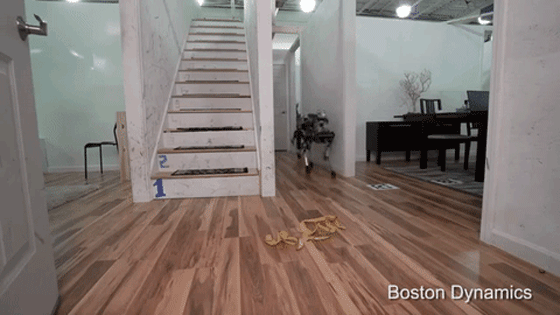Posts tagged robots
DARPA stumblebot challenge (2015)
Let Robots Handle Your Emotional Burnout at Work
Deep acting, according to research, allows a worker to perform emotional labor with reduced emotional dissonance. Studies on administrative assistants and hotel service providers cite lower levels of stress, exhaustion, and cynicism in those who use the technique. While surface acting has been associated with job burnout and depression, those who practice deep acting tend to feel a greater sense of personal accomplishment at work.But while this and other recommendations to try mindfulness practice, meditation, and exercise may help laborers better manage problem customers and stressful jobs, they squarely place the responsibility of dealing with the rigors of emotional labor on the “victim.” Customers are never told to take ownership for the way they treat those serving them, or encouraged to practice their emotional intelligence when interacting with service representatives. As Laurie Penny writes about turning the ideology of self-care into a politicized anecdote to systemic issues: “Essentially, if we are sick, sad, and exhausted, the problem isn’t one of economics. There is no structural imbalance, according to this view — there is only maladaptation, requiring an individual response.”We can’t, however, shelve the unintended consequences of entirely replacing human service professionals with machines. Specifically, since the professional service industry is mostly comprised of women and, for some paid out on an hourly basis, those with less education. Assuming such work becomes automated in the future, these people may not have to perform the emotional labor associated with their previous professions — but they could find themselves out of a job. If robots begin to replace occupations for specific demographics, this will quickly become a political issue, even if we can get the technology right.
via https://howwegettonext.com/let-robots-handle-your-emotional-burnout-at-work-e09babbe81e8
untitled 146422157832

“Key to the success of the spycam missions are the animatronic cameras cleverly disguised as lifesize penguins which can…
“Key to the success of the spycam missions are the animatronic cameras cleverly disguised as lifesize penguins which can silently infiltrate the colonies to record the penguins’ often emotional, and sometimes amusing, behaviour.“
Poison-Injecting Robot Submarine
This one-shot poison (which is harmless to everything else on the reef) is what makes autonomous robotic sea star control possible, since it means that a robot can efficiently target individual sea stars without having to try and keep track of which ones it’s injected already so it can go back and repeat the process nine more times. At Queensland University of Technology in Australia, a group of researchers led by Matthew Dunbabin and Peter Corke spent the last decade working on COTSBot,* which has been specifically designed to seek out and murder crown-of-thorns sea stars as mercilessly and efficiently as possible.
http://spectrum.ieee.org/automaton/robotics/industrial-robots/poison-robot-submarine
20150612 (via http://flic.kr/p/vbqb99 )

20150612 (via http://flic.kr/p/vbqb99 )
Japanese Robots In Danger Of Being Replaced By Human Workers
Citing a need to “become more solid and get back to basics,” and “to sharpen our manual skills and further develop them,” Toyota CEO Mitsuru Kawai wants humans to take the place of machines in plants across Japan so workers can develop new skills and figure out ways to improve production lines and the car-building process.
http://io9.com/japanese-robots-in-danger-of-being-replaced-by-human-wo–1561280442/+georgedvorsky
Giant Robotic Mining Trucks Love the Australian Desert
In the dusty red earth of Western Australia, robot trucks haul iron ore. The trucks themselves weigh about 500 tons when loaded — they are truly massive. They operate more or less on their own, navigating mining roads connecting the sprawling Pilbara iron mines with a guidance system provided by global positioning satellites, radars and lasers. It’s part of $13 billion mining operation by Rio Tinto, one of the world’s largest mining firms.
Robots at Work and Play
Advancements in robotics are continually taking place in the fields of space exploration, health care, public safety, entertainment, defense, and more. These machines – some fully autonomous, some requiring human input – extend our grasp, enhance our capabilities, and travel as our surrogates to places too dangerous for us to go. NASA currently has dozens of robotic missions underway, with satellites now in orbit around our moon and four planets – and two more on the way to Ceres and Pluto. Gathered here are recent images of robotic technology at the beginning of the 21st century.
http://www.theatlantic.com/infocus/2012/10/robots-at-work-and-play/100389/